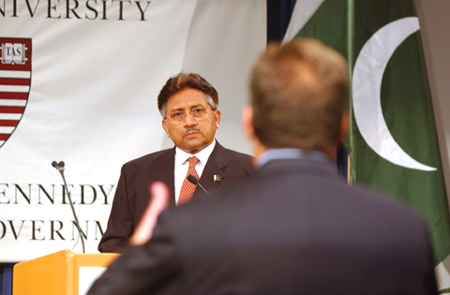Pakistan’s Musharraf speaks at KSG

Pakistani President Gen. Pervez Musharraf reaffirmed Pakistan’s support for the U.S.-led war on terror during a Sept. 8 speech at the Kennedy School of Government, but drew the line at aiding a U.S.-led war on Iraq, saying Pakistan already “has its hands full.”
Musharraf, speaking amid tight security to a packed ARCO Forum, spent a good deal of his speech describing the problems facing the South Asian nation. In addition to what he called Pakistan’s ongoing involvement in the war on terror, Musharraf spoke about internal reforms aimed at restoring democracy and boosting the economy, and about external conflicts over the disputed region of Kashmir.
“Pakistan has its hands full with so many problems, on our western border, domestically, our internal security. We don’t want to get involved with any other problems,” Musharraf said in response to a student question on possible U.S.-led action against Iraq.
Musharraf was the first of the academic year’s speakers at the Kennedy School’s ARCO Forum, which regularly attracts heads of state and other prominent members of government to address Kennedy School and other Harvard students.
The program was kicked off by Kennedy School Dean Joseph S. Nye Jr., who said the School is crafting an executive education program with Pakistan. Harvard President Lawrence H. Summers introduced Musharraf, saying Harvard’s cooperation with the Asian nation goes back to near the nation’s founding in 1947 and that Musharraf’s presence was a sign of the vitality of the Kennedy School.
Security was extremely tight for the event, with heavily armed police blocking John F. Kennedy and Eliot streets to traffic. Audience members entered the building only after having tickets and identifications scrutinized and passing through metal detectors.
Musharraf’s 30-minute speech emphasized Pakistan’s role as a partner of the international community and a force for stability in the region. Though he seized power in a 1999 coup, Musharraf repeatedly spoke of the importance of establishing a lasting, working democracy in the nation. He said Pakistan’s elected governments over the past three decades have been repeatedly marred by corruption and favoritism.
“All our reforms and political restructuring is aimed at creating sustainable democracy in Pakistan,” Musharraf said, then drawing a laugh from the crowd by adding, “I am extremely democratic; you have to take my word on it.”
Musharraf said there is no place for religious extremism in Pakistan and said educational reforms are being planned that will bring the religious schools closer to the mainstream educational system. He described numerous educational, economic, and political reforms that aim to alleviate poverty, empower women and the poor, and help make Pakistan a valuable, stable international ally in Asia.
“I see Pakistan as a strong force for regional stability,” Musharraf said. “Pakistan is and will remain a key member of the coalition against international terrorism. We wholeheartedly support the Bonn agreement and the [Afghan President Hamid] Karzai government.”
Musharraf spoke at length about the conflict between Pakistan and India over the disputed region of Kashmir, saying it is “unfinished business” remaining from the nation’s creation. He called for an election within Kashmir to determine its future, but denounced elections being held there this week, saying India was likely to manipulate them.
“Kashmir is the unfinished business of the creation of India and Pakistan. The solution lies in giving them their inalienable right to determine their own future,” Musharraf said. “Kashmir remains disputed territory. Without resolution, relations between India and Pakistan cannot be normalized.”
To combat terrorism, Musharraf said, the international community must address its root causes: poverty, military oppression, and stereotypes on both sides. He said a partnership between the United States and Pakistan is a good first step in that process.
“We must diagnose the malaise and treat the root cause,” Musharraf said. “Let us cast away our prejudices and follow a path of reconciliation.”
Though several questions from the audience were pointed, Musharraf appeared at ease as he responded. A few in the audience commented that, although he seized power, Musharraf seemed sincere in his concern for the Pakistani people.
“He is very sincere, very articulate, and very intelligent,” said Ayesha Kahn, a first-year Kennedy School student from Pakistan. Kahn said she is a bit cynical vis à vis army generals who talk about democracy but said she tends to believe Musharraf.
“He does very well fit the role of benign dictator, with his priorities right and working toward the betterment of the country,” Kahn said. “I would like to believe him. I’m quite a fan.”
Vivek Puri, a Kennedy School student whose parents came to the United States from India, said he also believes Musharraf wants the best for his country. Puri said he was impressed with Musharraf’s ability to handle potentially hostile questions from the audience.
“It really speaks to his education and polish,” Puri said. “I was impressed. He really knows how to spin himself.”




